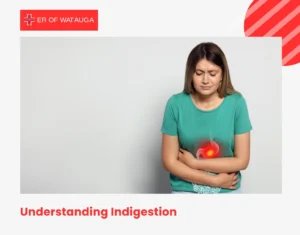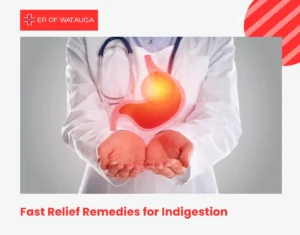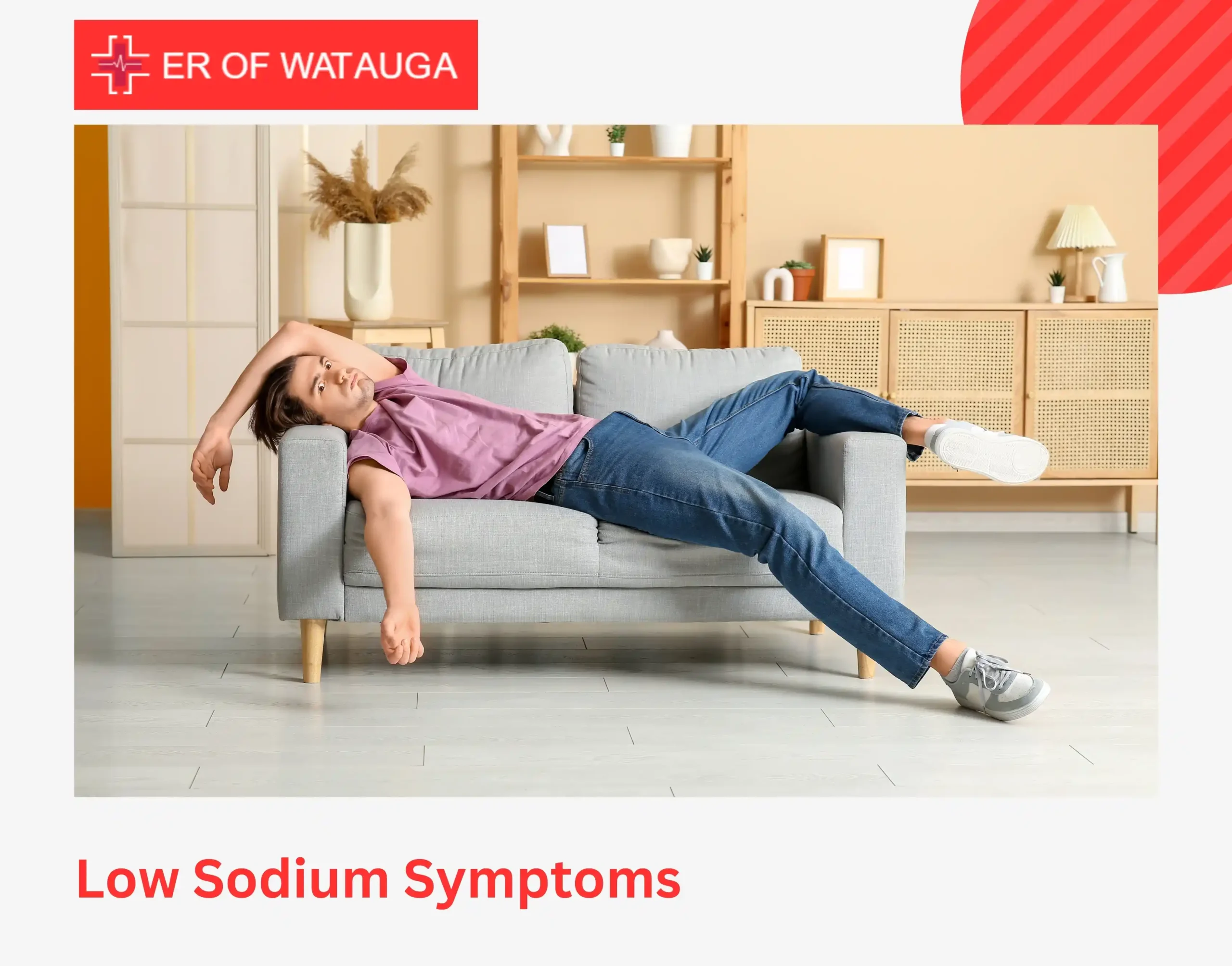Indigestion, also known as dyspepsia, is a common digestive issue that causes discomfort or pain in the upper abdomen. It often strikes after a heavy meal, spicy foods, or during stressful times.
Symptoms like bloating, nausea, or a burning sensation in the stomach can disrupt your day, but the good news is that there are several ways to find quick relief. This guide will cover how to cure indigestion fast.
Understanding Indigestion
Before diving into remedies, let’s break down what indigestion feels like and why it happens.
What is Indigestion?
Indigestion is not a disease but a collection of symptoms that affect the upper abdomen. Common symptoms include:
- Bloating or feeling overly full
- Belching and gas
- Nausea or vomiting
- Acidic taste in the mouth
- Growling stomach
- Burning sensation in the stomach or upper abdomen
- Abdominal pain
What are the Common Causes of Indigestion?
Indigestion can be triggered by various factors, including:
- Dietary Habits: Overeating, eating too quickly, or consuming fatty, greasy, or spicy foods.
- Beverages: Excessive alcohol or caffeine intake.
- Lifestyle: Smoking or high stress levels.
- Medications: Certain drugs, like antibiotics or nonsteroidal anti-inflammatory drugs (NSAIDs).
- Medical Conditions: Gastroesophageal reflux disease (GERD), stomach ulcers, gallbladder disease, or infections like H. pylori.
How long does indigestion last?
The duration of indigestion (dyspepsia) varies depending on its cause, severity, and how it’s managed. Here’s a breakdown:
- Typical Duration: Most cases of mild indigestion last a few hours to a day, especially if triggered by overeating, spicy foods, or stress.
- With Remedies: Over-the-counter antacids or home remedies like chamomile tea or baking soda can relieve symptoms within 30 minutes to 2 hours, though relief may be temporary if the underlying cause persists.
- Chronic Indigestion: If indigestion is caused by conditions like gastroesophageal reflux disease (GERD), irritable bowel syndrome (IBS), or H. pylori infection, symptoms may persist for days, weeks, or longer without treatment. Functional dyspepsia (indigestion with no clear cause) can last months if not managed.
What helps indigestion when it’s not acid-related?
If you’re dealing with a specific condition, targeted treatment is necessary. For functional dyspepsia, finding the right approach may involve some experimentation. As functional disorders stem from the nervous system, standard medications might not be effective.
However, treatments that focus on nerve function, paired with mind-body therapies, are more likely to provide relief.
How to Cure Indigestion Fast | Remedies
Here are nine effective remedies to relieve indigestion quickly, along with instructions and precautions. Always consult to nearest ER in severe cases before trying new treatments, especially if you have underlying health conditions or take medications.
1. Antacids
Antacids are over-the-counter medications that neutralize stomach acid, providing rapid relief from heartburn and acid reflux.
How to Use: Follow the package instructions, typically taking 1-2 tablets as needed. Avoid exceeding the recommended dose to prevent side effects like diarrhea or constipation.
Precautions: Avoid taking antacids with other medications without consulting a healthcare professional, as they may interfere with absorption.
2. Baking Soda
Baking soda (sodium bicarbonate) acts as a natural antacid, neutralizing stomach acid to relieve bloating, gas, and heartburn.
How to Use: Dissolve 1/2 teaspoon of baking soda in 4 ounces of water and drink it 1-2 hours after a meal. Limit to 7 doses in 24 hours for adults (3 for those over 60) and avoid use for more than two weeks without medical advice.
Precautions: Overuse can cause side effects like increased blood pressure or swelling. Not suitable for children under 12 unless directed by a doctor.
3. Ginger
Ginger has anti-inflammatory and antioxidant properties that can speed up stomach contractions, reducing nausea, gas, and bloating. Studies suggest it may improve dyspepsia symptoms by 35-73% in cases related to H. pylori.
How to Use: Drink ginger tea (steep fresh ginger slices in hot water for 10 minutes), chew a small piece of fresh ginger, or take ginger supplements (up to 4g daily). Ginger candies are another option.
Precautions: Excessive ginger may cause gas or heartburn. Consult a doctor if you’re on blood thinners.
4. Chamomile Tea
Chamomile tea may reduce stomach acid and inflammation, soothing an upset stomach and relaxing digestive muscles.
How to Use: Steep 1-2 chamomile tea bags in boiling water for 5-10 minutes. Add honey if desired and drink slowly.
Precautions: Consult a doctor if you’re on blood thinners, as chamomile contains coumarin, which may affect clotting.
5. Peppermint
Peppermint relaxes gastrointestinal muscles and improves bile flow, aiding digestion and reducing bloating.
How to Use: Drink peppermint tea or suck on peppermint candies after meals. Enteric-coated peppermint oil capsules (90 mg with 50 mg caraway oil) may also help.
Precautions: Avoid peppermint if you have GERD or acid reflux, as it may relax the esophageal sphincter, worsening symptoms.
6. Apple Cider Vinegar (ACV)
ACV may increase stomach acid to aid digestion, though scientific evidence is limited.
How to Use: Mix 1-2 teaspoons of raw, unpasteurized ACV in a glass of water and drink before meals or when symptoms arise.
Precautions: Excessive or undiluted ACV can erode tooth enamel or irritate the throat. Rinse your mouth after drinking.
7. Fennel Seeds
Fennel seeds may reduce gas and bloating, helping to alleviate indigestion symptoms.
How to Use: Chew 1/2 teaspoon of crushed fennel seeds after meals or steep them in hot water for 10 minutes to make tea.
Precautions: Possible side effects include nausea or sun sensitivity. More human studies are needed to confirm efficacy.
8. Lemon Water
Lemon water may neutralize stomach acid and stimulate digestion due to its alkaline effect.
How to Use: Squeeze the juice of half a lemon into a glass of warm water and drink a few minutes before eating.
Precautions: Excessive lemon juice may erode tooth enamel. Rinse your mouth after drinking.
9. Probiotics
Probiotics help balance gut bacteria, potentially improving digestion and reducing indigestion symptoms.
How to Use: Eat probiotic-rich foods like yogurt, kefir, or sauerkraut, or take probiotic supplements as directed.
Precautions: Consult a doctor before starting supplements, especially if you have a compromised immune system.
10. Lifestyle Changes
Simple lifestyle adjustments can prevent and relieve indigestion:
- Eat Smaller Meals: Avoid large meals to reduce stomach strain.
- Avoid Lying Down After Eating: Wait at least 2-3 hours to prevent acid reflux.
- Limit Trigger Foods: Reduce spicy, fatty, or acidic foods.
- Quit Smoking: Smoking can irritate the stomach lining.
- Manage Stress: Try meditation, yoga, or talk therapy to reduce stress-induced indigestion.
Remedy Comparison Table
Remedy |
How It Works |
Usage |
Precautions |
| Antacids | Neutralizes stomach acid | Take as needed per package instructions | Avoid overuse; may interact with other medications |
| Baking Soda | Neutralizes stomach acid | 1/2 tsp in 4 oz water, max 7 doses/day (3 for over 60) | Not for long-term use; avoid in children under 12 |
| Ginger | Reduces nausea, speeds digestion | Tea, fresh ginger, or supplements (up to 4g daily) | Excess may cause gas or heartburn; consult if on blood thinners |
| Chamomile Tea | Reduces stomach acid, inflammation | Steep 1-2 tea bags for 5-10 minutes | Avoid if on blood thinners |
| Peppermint | Relaxes digestive muscles | Tea, candies, or enteric-coated capsules | Avoid with GERD or acid reflux |
| Apple Cider Vinegar | May increase stomach acid for digestion | 1-2 tsp in water before meals | Can erode tooth enamel; limited evidence |
| Fennel Seeds | Reduces gas and bloating | Chew 1/2 tsp or make tea | Possible nausea or sun sensitivity |
| Lemon Water | Neutralizes stomach acid | Juice of half a lemon in warm water before meals | Rinse mouth to protect tooth enamel |
| Probiotics | Balances gut bacteria | Eat yogurt, kefir, or take supplements | Consult doctor for supplements if immunocompromised |
What can I do to prevent indigestion?
Eat smaller, more frequent meals and chew slowly to reduce stomach strain, while avoiding trigger foods like spicy, fatty, or high-FODMAP items (e.g., beans, onions). Stay upright for 2-3 hours after eating, manage stress with techniques like deep breathing or yoga, and stay hydrated with 8-10 cups of water daily, sipping slowly during meals.
Regular light exercise, quitting smoking, maintaining a healthy weight, and limiting stomach-irritating medications like NSAIDs can further help. Incorporating probiotics from yogurt or supplements may support gut health, but consult a doctor if symptoms persist or worsen to address potential underlying issues.
When to See a Doctor?
While most indigestion cases can be managed at home, seek medical attention if you experience:
- Severe or persistent abdominal pain
- Unexplained weight loss
- Difficulty swallowing
- Persistent vomiting or vomiting blood
- Black, tarry stools
- Symptoms lasting over two weeks
These could indicate serious conditions like GERD, peptic ulcers, or even heart issues. Call 911 if you have chest pain, shortness of breath, or sweating, as these may signal a heart attack.
FAQs
1. What is indigestion, and what does it feel like
Indigestion (dyspepsia) is discomfort or pain in the upper abdomen, often after eating. It may feel like bloating, fullness, nausea, burning, or mild cramping, sometimes accompanied by belching, gas, or an acidic taste in the mouth.
2. What causes indigestion?
Overeating, spicy or fatty foods, stress, smoking, alcohol, caffeine, or medications like NSAIDs can trigger indigestion. It may also stem from conditions like GERD, ulcers, or functional dyspepsia (non-acid-related).
3. How can I relieve indigestion quickly?
Try over-the-counter antacids (e.g., Tums) for acid-related symptoms, or sip ginger tea, chamomile tea, or 1/2 tsp baking soda in 4 oz water for fast relief. Peppermint tea or fennel seeds can help with bloating, but avoid peppermint if you have GERD.
4. Are there home remedies for non-acid-related indigestion?
Yes, ginger or peppermint tea can improve stomach emptying, while probiotics (e.g., yogurt) balance gut bacteria. Stress management techniques like deep breathing or yoga can also reduce symptoms linked to functional dyspepsia.
5. How long does indigestion typically last?
Mild indigestion usually lasts a few hours to a day. Remedies like antacids can provide relief within 30 minutes to 2 hours. Chronic symptoms lasting over two weeks may need medical evaluation.










